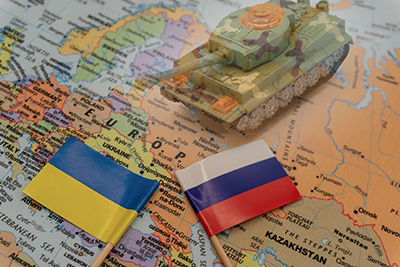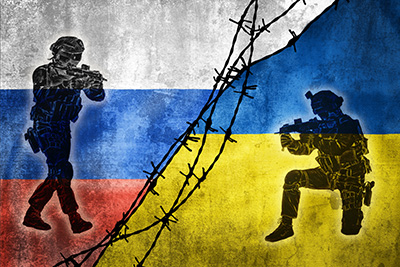Finding Your Path
Rooting for the Underdog
By Lorne Polger, Senior Managing Director

As a kid in Canada, I found myself rooting for the underdog. I’m not sure if this was due to my family experience as immigrants, the quiet Canadian underdog mentality, or some other element of my personality. But, except for always rooting on my cherished Montreal Canadiens (hardly the underdog in those days), I enjoyed the little guy upsetting the big guy. I even enjoyed watching the animated Underdog television series which ran on NBC on Saturday mornings from 1964-1967. Who can forget the famous theme song? “When criminals in this world appear, and break the laws that they should fear, and frighten all who see or hear, the cry goes up both far and near for Underdog! Underdog! Underdog!”
I’ve been thinking about the underdog in the context of the current conflict between Russia and Ukraine. My ancestry is Ukrainian. All four of my grandparents were either born in Ukraine or to parents who were born there. The various Russian “pogroms” (an organized massacre of a particular ethnic group; Jews in Russia/Eastern Europe in the late 19th and early 20th centuries) led them and their families to seek better and safer lives in the U.S. and Canada, like so many before them and so many since. We have a video of my maternal grandmother telling the harrowing story of her family’s multiyear journey from Ukraine to Canada, complete with maps, props, and stories of sneaking under fences and across lakes in rowboats during the night to avoid the dreaded border guards. So, there’s that part of it.
While, for those reasons, it may be personal to me, why do we care so much about this particular conflict? And why is it important to root for (and support) Ukraine now, other than Zelensky’s role as a newfound superhero? Many reasons come to mind.
 First, we feel a need to stop the unchecked aggressive behavior of the Putin regime/dictatorship. For if we don’t stop him here, who’s next? He’s already made Belarus a satellite and annexed Crimea. The most vulnerable could be those who aren’t members of NATO or the European Union, and thus alone and unprotected – including Ukraine’s neighbor Moldova and Russia’s neighbor Georgia, both formerly part of the Soviet Union – along with the Balkan states of Bosnia and Kosovo. But even NATO members, like the Baltic countries, Latvia, Lithuania and Estonia, could be at risk too, as they’re all within “artillery range” of Russia’s borders. The U.S. and E.U. countries have democratic forms of government that, theoretically, self-police this type of aggressive behavior. Not so with Russia (or China for that matter, but that is a longer topic).
First, we feel a need to stop the unchecked aggressive behavior of the Putin regime/dictatorship. For if we don’t stop him here, who’s next? He’s already made Belarus a satellite and annexed Crimea. The most vulnerable could be those who aren’t members of NATO or the European Union, and thus alone and unprotected – including Ukraine’s neighbor Moldova and Russia’s neighbor Georgia, both formerly part of the Soviet Union – along with the Balkan states of Bosnia and Kosovo. But even NATO members, like the Baltic countries, Latvia, Lithuania and Estonia, could be at risk too, as they’re all within “artillery range” of Russia’s borders. The U.S. and E.U. countries have democratic forms of government that, theoretically, self-police this type of aggressive behavior. Not so with Russia (or China for that matter, but that is a longer topic).
Second, the war is motivating the E.U. countries to wean themselves from their dependence on Russian oil and gas and to boost defense spending. Today, Germany and other European countries are highly dependent on Russian energy but they’re already taking steps to dramatically reduce their imports by year-end. It took the U.S. three years to enter World War II; it took Germany three days after Russia’s invasion to dramatically boost its defense spending. Critical income streams that the Kremlin has relied on to pay for both guns and butter may now be threatened. In early May, Ursula von der Leyen, the president of the European Commission, unveiled a proposal to impose an E.U.-wide ban on Russian oil imports, one of Moscow's main sources of revenue. The proposed embargo would give member states up to six months to phase out purchases of Russian crude, and until the end of the year to stop buying all refined oil products. The ban would apply to all Russian oil traded both via ports and pipelines. The E.U. is Russia's top oil client, spending more than $73 billion on Russian oil and gas products last year.
 Looking ahead, it is looking more precarious for Russian energy exports and, by extension, the overall Russian economy. Ordinary Russians are feeling the pain of having bank withdrawals curtailed, credit cards issued abroad deactivated and, for those who were employed by foreign companies, permanent layoffs. Not to mention no more lattes at Starbucks® or Big Macs at McDonalds®. Not so good for ordinary Russians. Perhaps something Putin doesn’t pay much attention to, but at some point, that could change.
Looking ahead, it is looking more precarious for Russian energy exports and, by extension, the overall Russian economy. Ordinary Russians are feeling the pain of having bank withdrawals curtailed, credit cards issued abroad deactivated and, for those who were employed by foreign companies, permanent layoffs. Not to mention no more lattes at Starbucks® or Big Macs at McDonalds®. Not so good for ordinary Russians. Perhaps something Putin doesn’t pay much attention to, but at some point, that could change.
Third, Russia’s invasion has motivated Finland and Sweden to join NATO. Officials in both countries have expressed growing alarm over Russian intentions in northern Europe, and recent public opinion polls in both countries now show majorities in favor of joining NATO. Does Putin worry? Nah. He’s got ice in his veins and is the ultimate cold war spy strategist. Should he though? You betcha. Finnish and Swedish membership would add significant resources to NATO along a very long border with Russia while also creating further pressure for Russia in the Baltic Sea.
Fourth, the Russian invasion of Ukraine creates risk for the global economy. The U.S. and E.U. economies remain relatively vibrant, but they’re also susceptible to recession caused by the oil shock along with continued supply chain disruptions, some exacerbated by the conflict. We are increasingly reliant on global trade, and a continuation of the conflict could have a significant negative impact on that. As we know, the continued expansion of the economy ties in to so many different elements in the U.S., including employment and housing.
Fifth, and most importantly, we’re motivated by protecting the Ukrainian people from the devastating effects that war brings. The daily scenes of death and destruction across so many Ukrainian cities is difficult to watch on the nightly news. It must be worse than we can imagine.
So, there are important reasons to both root for and support Ukraine and its people. But at what expense to us? Burned by the long foreign wars in Iraq and Afghanistan, there is clearly little appetite in the U.S. to see more of our soldiers pay the ultimate price.
At the end of April, President Biden called for a giant $33 billion package of military and economic aid to Ukraine (more than doubling the level of U.S. assistance to date). The President asked Congress to give immediate approval for spending that would include over $20 billion in military aid, involving everything from heavy artillery and armored vehicles to greater intelligence sharing, and more anti-tank and anti-aircraft missiles. The President also requested $8.5 billion in economic aid to Kyiv and $3 billion in humanitarian relief, as well as funds to help increase U.S. production of food crops and strategic minerals to offset the impact of the war on global supplies. The request is larger than the entire defense budget of Ukraine.
In addition, since Moscow invaded Ukraine on Feb. 24, the Biden administration has reportedly deployed more than 100,000 U.S. troops to NATO-member countries. I suspect the Biden administration is not yet done in either category.
These are real costs. These are dollars that will not flow into infrastructure or social programs in the U.S. But, for the reasons noted above, they are probably equally essential to our long-term protection, health and security.
The human loss of any war is tragic. Not to intervene when we know that mass murder is imminent could be regarded as irresponsible. But what is our ethical duty to another democratic nation, even one halfway around the world? Could we do more than we have done so far? Should we?
I’m rooting for the underdog on this one.
Lorne Polger is Senior Managing Director of Pathfinder Partners. Prior to co-founding Pathfinder in 2006, Lorne was a partner with a leading San Diego law firm, where he headed the Real Estate, Land Use and Environmental Law group. He can be reached at lpolger@pathfinderfunds.com.
Share this Article
IN THIS ISSUE
PATHFINDER PARTNERS INCOME FUND, L.P.
A Stablized Multifamily Fund
CHARTING THE COURSE
The Fed is Between a Rock and a Very Hard Place
FINDING YOUR PATH
Rooting for the Underdog
GUEST FEATURE
Stopping Hackers in Their Tracks: How You Can Stay Vigilant to Guard Against Cyber Threats
ZEITGEIST
Sign of the Times
TRAILBLAZING
FortyOne 11, Portland, OR
NOTABLES AND QUOTABLES
Inflation
